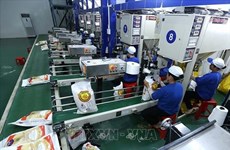Urbanisation important for Vietnam’s future
On April 5 the World Bank (WB) released its Vietnam Urbanisation Review,
which underlines the key role of urbanisation in the national economic
development strategy.
On April 5 the World Bank (WB) released its Vietnam Urbanisation Review,
which underlines the key role of urbanisation in the national economic
development strategy.
The report is to provide a better understanding of the key dimensions and aspects of Vietnam ’s urbanisation process, as well as identifying trends, opportunities, challenges and core policy priorities for the country.
Victoria Kwakwa, Country Director for the World Bank in Vietnam , said that Vietnam is urbanising rapidly and this process is important for Vietnam ’s future. Ensuring cities are livable and can also compete regionally and globally will be an essential part of Vietnam ’s economic development strategy.
According to the Report, Vietnam is urbanising at a rate of 3.4 percent per year, most of which is in and around Ho Chi Minh City and Hanoi .
Urbanisation, especially in the two large economic centres, plays a central role in Vietnam ’s economic growth and poverty reduction strategy.
However, the existing urban systems in Ho Chi Minh City and Hanoi are seriously limiting their competitive advantages, especially regarding logistical bottlenecks, the disproportionately high transport costs, growing congestion and distortions in the land market.
The report suggests that in the largest cities, more attention should be paid to improving urban transport and infrastructure systems, as well as strengthening the competitiveness of these economic regions.
The Report argues that while Vietnam has done a relatively good job in providing basic services and the lack of large scale slums suggests that most people have access to housing, there are definitely signs that this is changing.
The reports final analysis suggests that the typical housing provided today by formal land developers is affordable to only the top 5 percent of workers in Hanoi and Ho Chi Minh. Vietnam ’s two tiered land pricing system and lack of transparency in the land market needs to be addressed as does the extensive use of land sales and leases to finance local budgets, a practice that tends to encourage urban sprawl.
The report calls on planners to address the problem of urban mobility to improve livability in cities and provide transport options for every citizen, including the urban poor, children, the elderly and disabled.
Addressing these problems also means modernising and reforming Vietnam ’s planning systems, strengthening urban management and ensuring better coordination between different levels of government as well as between city departments.
Dean A.Cira, a leading Urban Specialist for the World Bank in Vietnam , who led the team that produced the report, said that well managed urbanisation could support Vietnam ’s economic growth and help its Socio-Economic Development Strategy objectives.
He said he hopes that this report will act as an important reference for Vietnam’s policy makers and others concerned about Vietnam’s urbanisation process.-VNA
The report is to provide a better understanding of the key dimensions and aspects of Vietnam ’s urbanisation process, as well as identifying trends, opportunities, challenges and core policy priorities for the country.
Victoria Kwakwa, Country Director for the World Bank in Vietnam , said that Vietnam is urbanising rapidly and this process is important for Vietnam ’s future. Ensuring cities are livable and can also compete regionally and globally will be an essential part of Vietnam ’s economic development strategy.
According to the Report, Vietnam is urbanising at a rate of 3.4 percent per year, most of which is in and around Ho Chi Minh City and Hanoi .
Urbanisation, especially in the two large economic centres, plays a central role in Vietnam ’s economic growth and poverty reduction strategy.
However, the existing urban systems in Ho Chi Minh City and Hanoi are seriously limiting their competitive advantages, especially regarding logistical bottlenecks, the disproportionately high transport costs, growing congestion and distortions in the land market.
The report suggests that in the largest cities, more attention should be paid to improving urban transport and infrastructure systems, as well as strengthening the competitiveness of these economic regions.
The Report argues that while Vietnam has done a relatively good job in providing basic services and the lack of large scale slums suggests that most people have access to housing, there are definitely signs that this is changing.
The reports final analysis suggests that the typical housing provided today by formal land developers is affordable to only the top 5 percent of workers in Hanoi and Ho Chi Minh. Vietnam ’s two tiered land pricing system and lack of transparency in the land market needs to be addressed as does the extensive use of land sales and leases to finance local budgets, a practice that tends to encourage urban sprawl.
The report calls on planners to address the problem of urban mobility to improve livability in cities and provide transport options for every citizen, including the urban poor, children, the elderly and disabled.
Addressing these problems also means modernising and reforming Vietnam ’s planning systems, strengthening urban management and ensuring better coordination between different levels of government as well as between city departments.
Dean A.Cira, a leading Urban Specialist for the World Bank in Vietnam , who led the team that produced the report, said that well managed urbanisation could support Vietnam ’s economic growth and help its Socio-Economic Development Strategy objectives.
He said he hopes that this report will act as an important reference for Vietnam’s policy makers and others concerned about Vietnam’s urbanisation process.-VNA












